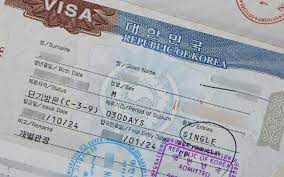Canada Visa for South Korean Citizens

Canada has always been a popular destination for travelers, students, and professionals from around the world. South Korean citizens, in particular, are increasingly interested in visiting, studying, or working in Canada due to the country’s high quality of life, excellent educational institutions, and diverse employment opportunities. If you are a South Korean citizen looking to travel to Canada, understanding the visa requirements and application process is crucial. This article provides comprehensive information about the different types of visas available, the application process, and other essential details you need to know. CANADA VISA FOR SOUTH KOREAN CITIZENS
Types of Canadian Visas
When considering a trip to Canada, it’s essential to determine which type of visa suits your purpose of visit. Canada offers several types of visas for South Korean citizens:
Visitor Visa (Temporary Resident Visa)
A Visitor Visa, also known as a Temporary Resident Visa (TRV), is required for South Korean citizens who wish to visit Canada for tourism, family visits, or short business trips. This visa allows you to stay in Canada for up to six months. It can be a single-entry visa, which permits entry into Canada only once, or a multiple-entry visa, allowing you to enter and exit Canada multiple times during the visa’s validity period.
Study Permit
For South Korean students looking to pursue education in Canada, a Study Permit is necessary. This permit is issued to students who have been accepted by a recognized Canadian educational institution. The study permit is generally valid for the duration of the study program, plus an additional 90 days to allow the student to prepare for departure or apply for an extension or work permit.
Work Permit
If you plan to work in Canada, you will need a Work Permit. There are various types of work permits depending on the nature of your job. The most common types include employer-specific work permits and open work permits. An employer-specific work permit allows you to work for a particular employer in a specific position, while an open work permit provides the flexibility to work for any employer in Canada.
Permanent Residence Visa
For South Korean citizens looking to settle permanently in Canada, applying for a Permanent Residence (PR) Visa is the best option. Canada offers several immigration programs for PR, such as the Express Entry system, Provincial Nominee Programs (PNPs), and family sponsorships. These programs are designed to attract skilled workers, entrepreneurs, and family members of Canadian citizens or permanent residents.
Application Process
Applying for a Canadian visa involves several steps. Here’s a detailed guide on how South Korean citizens can navigate the visa application process:
Step 1: Determine Your Visa Type
Before starting your application, identify the type of visa you need based on the purpose of your visit. Each visa type has specific requirements and application procedures. CANADA VISA FOR ISRAELI CITIZENS
Step 2: Gather Required Documents
Collect all necessary documents for your visa application. Common documents include:
- A valid South Korean passport
- Completed visa application forms
- Proof of financial support
- Invitation letter (if applicable)
- Acceptance letter from a Canadian educational institution (for study permits)
- Job offer letter (for work permits)
- Medical examination results (if required)
- Police clearance certificate (if required)
Step 3: Submit Your Application
You can apply for a Canadian visa online through the Immigration, Refugees and Citizenship Canada (IRCC) website or at a Visa Application Centre (VAC) in South Korea. For online applications, create an account on the IRCC portal, fill out the necessary forms, upload the required documents, and pay the application fee.
Step 4: Biometrics Appointment
After submitting your application, you may be required to provide biometric information (fingerprints and photographs). Schedule an appointment at a designated VAC to complete this step.
Step 5: Attend an Interview (if required)
In some cases, you might be asked to attend an interview at the Canadian embassy or consulate. Be prepared to answer questions about your application, travel plans, and background.
Step 6: Wait for Processing
The processing time for visa applications varies depending on the type of visa and other factors. You can check the estimated processing times on the IRCC website. During this period, the visa office may contact you for additional information or documentation.
Step 7: Receive Your Visa
Once your visa application is approved, you will receive your visa, either as a sticker in your passport (for visitor visas) or as a letter (for study and work permits). Ensure that all the information on the visa is correct.
Living in Canada
Cost of Living
Understanding the cost of living in Canada is essential for budgeting your stay. Major expenses include accommodation, food, transportation, healthcare, and education. The cost of living can vary significantly depending on the city or region you choose to live in.
Healthcare
Canada has a publicly funded healthcare system, but as a visitor, student, or temporary worker, you may need to obtain private health insurance. Ensure you have adequate coverage for the duration of your stay.
Accommodation
Finding suitable accommodation is a crucial part of moving to Canada. Options include renting apartments, staying in student residences, or living with host families. Researching and arranging accommodation before your arrival can ease your transition.
Employment Opportunities
For those on work permits, understanding the job market and employment opportunities in Canada is vital. Research industries and regions with high demand for your skills and qualifications. Networking and leveraging job search platforms can also be beneficial.
Cultural Adjustment
Adjusting to a new culture can be challenging. Canada is known for its multicultural society, but understanding local customs, traditions, and social norms will help you integrate more smoothly. Participating in community activities and making connections with locals can enhance your experience.
Conclusion
Canada offers a wealth of opportunities for South Korean citizens, whether you are visiting, studying, or working. Understanding the different visa types, the application process, and other essential considerations is key to a successful and fulfilling experience in Canada. By following the guidelines outlined in this article and preparing thoroughly, you can make your journey to Canada smooth and rewarding. Whether you are exploring the vibrant cities, advancing your education, or pursuing new career opportunities, Canada welcomes you with open arms.
